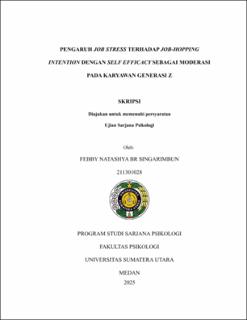| dc.contributor.advisor | Ginting, Eka Danta Jaya | |
| dc.contributor.author | Singarimbun, Febby Natashya Br | |
| dc.date.accessioned | 2025-07-21T08:12:17Z | |
| dc.date.available | 2025-07-21T08:12:17Z | |
| dc.date.issued | 2025 | |
| dc.identifier.uri | https://repositori.usu.ac.id/handle/123456789/106035 | |
| dc.description.abstract | The increasing prevalence of job hopping intention among Generation Z employees is
influenced by various factors, notably job stress within the workplace. This study
investigates the effect of job stress on job hopping intention, while examining self
efficacy as a moderating variable. Employing a quantitative design with a correlational
approach, the sample comprised 173 Generation Z employees working in Medan,
Indonesia, with a tenure of less than two years, selected through convenience sampling.
Data were collected using structured questionnaires distributed via Google Forms,
encompassing validated and reliable scales measuring job stress, job hopping intention,
and self-efficacy. Analytical procedures were conducted using Moderated Regression
Analysis (MRA) to test the moderating role of self-efficacy in the relationship between
job stress and job hopping intention. The results revealed a significant effect (p = 0.001
< 0.05), along with an increase in the coefficient of determination (R²) from 0.358
(simple regression) to 0.463 (with moderation), indicating that self-efficacy contributes
additional explanatory value. These findings suggest that self-efficacy moderates the
relationship between job stress and job hopping intention, and plays a substantial role
in shaping employment behavior among Generation Z. | en_US |
| dc.language.iso | id | en_US |
| dc.publisher | Universitas Sumatera Utara | en_US |
| dc.subject | Job Hopping Intention | en_US |
| dc.subject | Job Stress and Self-Efficacy | en_US |
| dc.subject | Generation Z | en_US |
| dc.title | Pengaruh Job Stress Terhadap Job Hopping Intention Dengan Self Efficacy Sebagai Moderasi Pada Karyawan Generasi Z | en_US |
| dc.title.alternative | The Influence of Job Stress on Job Hopping Intention with Self Efficacy as a Moderating Variabel Among Generation Z Employees | en_US |
| dc.type | Thesis | en_US |
| dc.identifier.nim | NIM211301028 | |
| dc.identifier.nidn | NIDN0019087303 | |
| dc.identifier.kodeprodi | KODEPRODI73201#Psikologi | |
| dc.description.pages | 139 Pages | en_US |
| dc.description.type | Skripsi Sarjana | en_US |
| dc.subject.sdgs | SDGs 8. Decent Work And Economic Growth | en_US |


